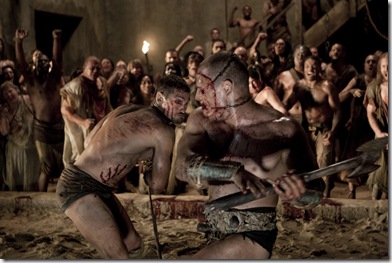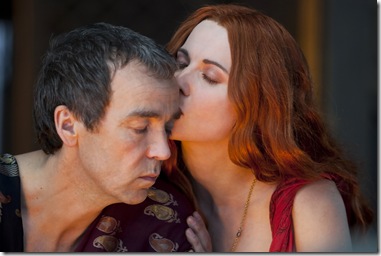If you like a bit of conniving, plotting and skulduggery with your sex and violence, then Spartacus: Blood and Sand [Starz, tonight, 10/9C] just may be the show for you. This very extreme new series is shot in the same manner as Zack Snyder’s epic 300 – apart from a few sets, and its props, the rest is CG. The result is a rich and gorgeous – if peculiarly colored – world.
The story of Spartacus [Andy Whitfield, Gabriel] is that of a Thracian betrayed by Rome; separated from his wife [who is raped and sold into slavery]; forced to become a gladiator [where he wins fame and glory], before finally leading a revolt against the declining Roman Empire. The story made for one of the best spear and sandal epics ever made [with Kirk Douglas as Spartacus], but the series will hope to go into far greater detail and tell the story over several seasons.
In the series, it takes four episodes to tell the story of how Spartacus was betrayed and became a gladiator [with a pit stop for fighting to the death in The Pit]. After being betrayed, he is purchased by the financially embarrassed owners of a ludus [gladiator school], Batiatus [John Hannah, The Mummy Trilogy] and his wife, Lucretia [Lucy Lawless, Xena, Battlestar Galactica], where he is trained by the formidable Doctore [Peter Mensah, 300, Avatar] and gains allies and enemies from amongst the crop of would-be gladiators and the seasoned pros.
There is a great deal of nudity and sex – which are treated differently according to whether we’re talking lovemaking or simple lust [and the sex plays into the politics in unexpected ways] – and crass language. Sadly, series creator Steven S. DeKnight does not have the poetic flair for vulgar language of a David Milch, but his plotting is entertaining enough – and hey! Blood and orgies!
Spartacus: Blood and Sand has a good-sized cast and includes the Roman commander who betrayed Spartacus, Legate Glaber [Craig Parker] and his ambitious wife, Ilythia [Viva Bianca]; Spartacus’ wife, Sura [Erin Cummings]; Crixus [Manu Bennett], the Champion of Capua [and one of the enemies I referred to above], among others.
The effects are, by necessity, both really good and omnipresent. When a gladiator is injured, blood doesn’t just spurt; it pumps, splashes, splatters and hangs in the air before becoming a pink mist and fading away. The fight sequences are, far and away, the most brutal ever filmed specifically for television and I can imagine how much work goes into the various effects required to make those sequences look real. The use of varying speeds is also used to good effect, but could become either a trademark or a cliché – depending on how often [and how well] it’s used.
Spartacus: Blood and Sand is not great art – it’s not even great television – but it does have a visceral appeal and some of the performances [especially by Hannah and Lawless] are quite good. Overall, though, it’s a spectacle that is unlike anything else on television – and it manages to not lapse into camp, which is a definite plus. The spectacle may, in fact, be the thing that draws an audience – at least, at first. Since Starz has given the series a second season commitment, it should have plenty of time – ratings permitted – to develop into something more.
Final Grade: B-

